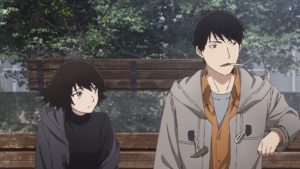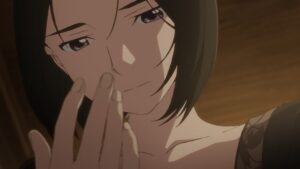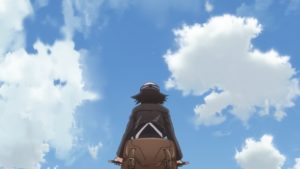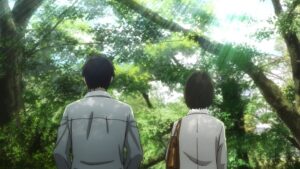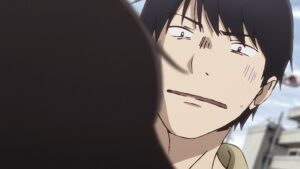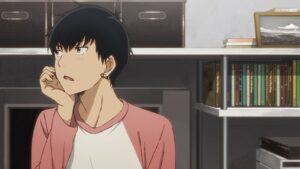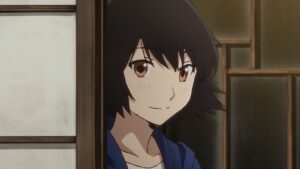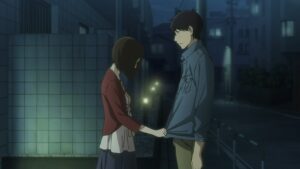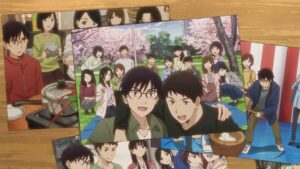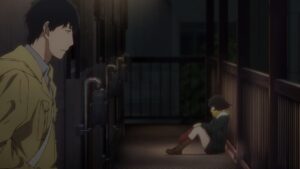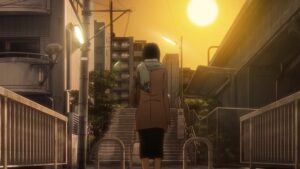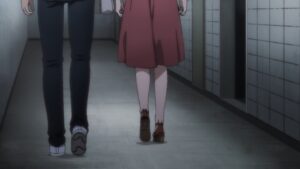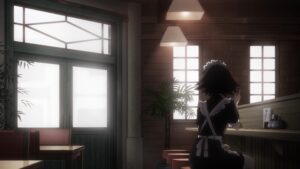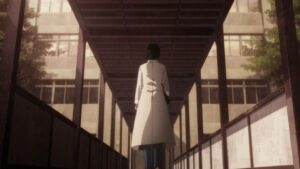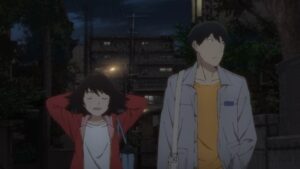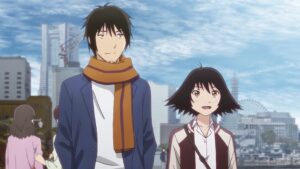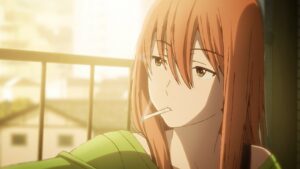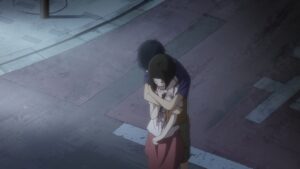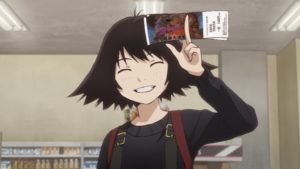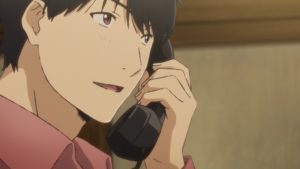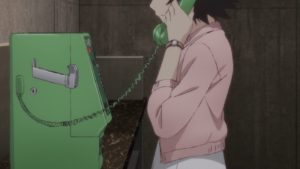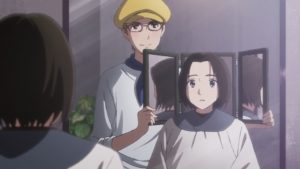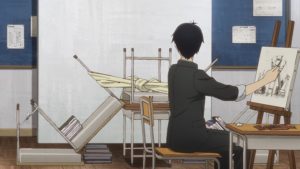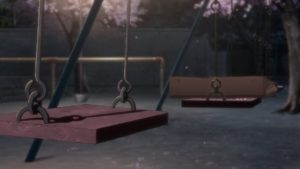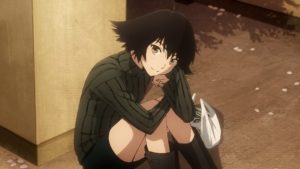How much weight should a poor conclusion have in the final analysis of an otherwise well-executed series? Should you take a mathematical approach, calculating which percentage of its episodes didn’t meet an average standard of goodness? Or should you work based on feelings – the degree to which your memory of the show is stained by a lousy ending? Personally, I’d say that either method is fine, so long as you factor in the strength of the series before its implosion. In Yesterday wo Utatte’s case, its first 11 episodes were better than its finale was bad. That schizophrenic bus monologue and badly-timed confession can’t erase the heartache of Shinako’s backstory, or the show’s excellent supporting character work, or its vivid sense of nostalgia. This is an anime that stood atop the spring season for most of its run, then punted its crown in week 12. That doesn’t mean it joins Shachou, Battle no Jikan desu! and Shadowverse at the bottom of the seasonal barrel; it just moves down a couple spots on the winner’s podium.
Category: Yesterday wo Utatte
Yesterday wo Utatte – 11-12
You’ve already heard the news by now, I’m sure, but the idea of this series getting an 18-episode order was a faulty bit of reporting by The Internet’s Most Trusted Anime News Source. Those six phantom episodes, once thought to be full-length TV offerings, actually referred to the short webisodes that followed half of the show’s regular installments. The last of those webisodes is available here, but you’d be forgiven for regarding it as insufficient closure; I doubt there’s a universe where a two-minute animated postmortem could fix what went down in episode 12 of Yesterday wo Utatte. Even as somebody who fully expected a Rikuo/Haru endgame, the conclusion I saw last Saturday was pretty damaging to the show’s overall reputation. But the final episode shouldn’t bear all the blame here – 11’s handling of the Rikuo/Shinako relationship set the stage for its sequel’s failure. If you’re wondering how that could be, hit the jump to see what I mean.
Yesterday wo Utatte – 09-10
I’m not the sort of person who chooses #teams while watching love triangle plots, but after this pair of episodes, if you put a gun to my head, I’d pick Haru. She’s received much less screen time than Shinako, but that only makes scenes like her hug with Rikuo on the apartment landing more rewarding. Their contrasting heights and levels of enthusiasm made for a great shot, and their follow-up conversation was one of the best the show has orchestrated in weeks. Even if we still don’t really understand why Haru likes this dude so much, she’s straightforward about her feelings! She keeps stopping by his apartment because, in her words, it’s “more fun than waiting” for him to contact her or reciprocate her crush. She’s clingy, but she’s also way more honest than either Rikuo or Shinako, who keep dancing around each other like teenagers (ironically, Haru is the only teenager among the three of them).
Yesterday wo Utatte – 08 [Innocent Blue]
How could you screw up this badly, Rikuo? Shinako just got finished telling you to be more assertive in episode 7, and now you bail at the first sign of hesitation after she’s invited you up to her apartment? I know you’re both awkward as hell, but all the situation called for was a reminder of her earlier request. Just teasingly say, “You’re the one who said I ought to be pushy,” give her a smile, and you’re probably golden. Even if you can’t manage that kind of line, at least generate some conversation as she’s leading you upstairs. For Pete’s sake, do *anything* other than what you did at the start of this episode!
Yesterday wo Utatte – 04-07
Yesterday wo Utatte is my favorite spring anime, so please don’t take my delay in covering it as a sign of disinterest. It’s one of only two shows that I watch on the day it releases (the other being Kaguya-sama). Its ability to introduce new characters and immediately dimensionalize them is exceptional, as it demonstrated in two of these four episodes. It also has a keen sense of where to aim its lens each week, using individual spotlights or telling stories in parallel to get the most from its cast of characters. Yesterday wo Utatte deserves better than this post (and this author), but here we are, a month behind due to self-quarantine blues, and I’ve got to publish something or I’ll never escape this rut. If you’re digging this show as much as I am, hit the jump for abbreviated thoughts on episodes 4-7, in that order (no lazy list post this time).
Yesterday wo Utatte – 03 [What Is Love?]
If Rikuo and Shinako were the main characters of episodes 1 and 2, respectively, then it’s only right that Haru got her turn with episode 3. I’d say this installment was the most laser focused so far, with Crow Girl being present in nearly every scene. Only the Rikuo and Shinako ‘sick with a cold’ bits distracted from Haru’s story this week, and they still fed into her failed movie date later in the episode. Honestly, those back-to-back colds gave me the impression that distant chapters were combined in order to achieve this timeline, but maybe late 90s manga just leaned on illness for everything. Either way, the show pulled it off thanks to its measured, dialogic storytelling – in Yesterday wo Utatte, everything falls into place if you put the characters’ conversations at the front of your mind.
Yesterday wo Utatte – 02 [A Blind Alley]
Ah, this episode hit the spot. Lots of good character animation, a strong introduction for the fourth member of the love rectangle, a tragic flashback, and plenty of interplay between past and present events. What I appreciated most about this one was the focal shift from Rikuo to Shinako – both episodes have had an ensemble feeling to them, but Rikuo was clearly The Protagonist of the premiere. A second, slightly tweaked version of “convenience store worker waffles between two women” would have felt terribly self-indulgent, but pivoting to Shinako’s point of view made that a non-issue. There’s so much to process regarding her character, from the death of her teenage love, to her regret over Haru’s suspension, to her real feelings for Rikuo. Most crucially of all, though, we must ask ourselves: what’s the deep meaning behind her new haircut?

